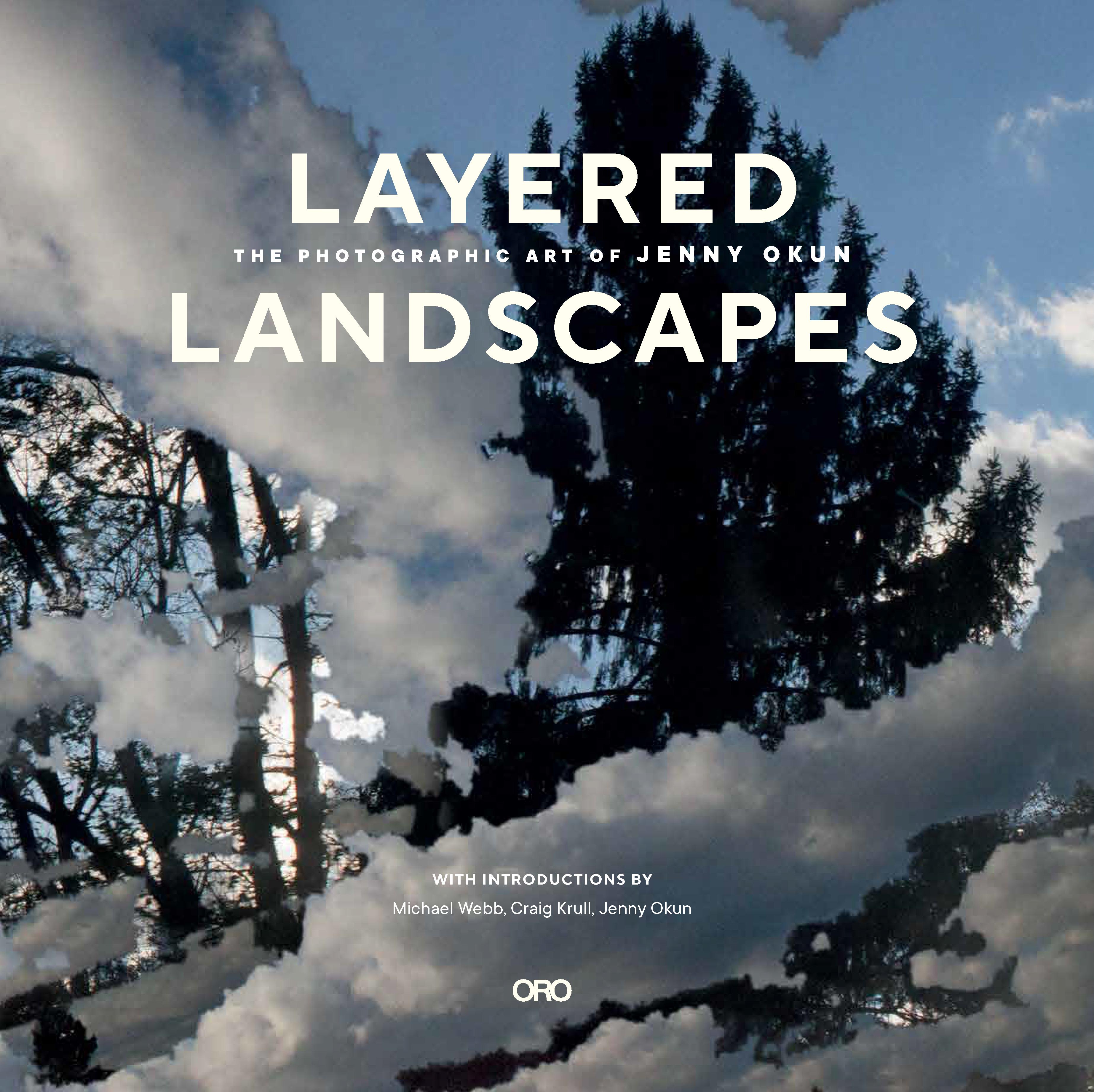




introductions by Michael Webb , Craig Krull, Jenny Okun
essays by Griff Rhys Jones, Thea Musgrave, Richard Sparks, Lee Holdridge, Kathy Lette, James Forrest, Annie Gatti, Steven Reich, Caleb Leech, Tania Compton, Gus Christie
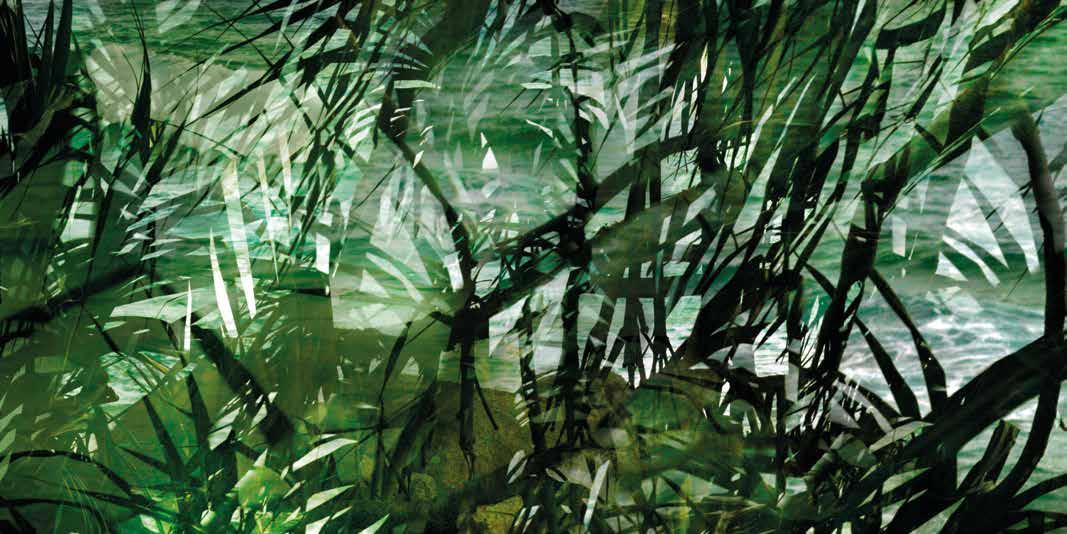
Introductions
Michael Webb 6
Craig Krull 12
Jenny Okun 18
Essays
Griff Rhys Jones 40
Thea Musgrave 45
Richard Sparks 49
Lee Holdridge 50
Kathy Lette 53
James Forrest 54
Annie Gatti 57
Steven Reich 62
Caleb Leech 65
Tania Compton 66
Gus Christie 70
Historical Quotes
Georgia O’Keeffe 81
Maya Angelou 82
Eric Newby 85
Sara Donati 86
Chris Bonnington 89
Pablo Picasso 91
Jules Verne 93
Lord Byron 94
John Muir 98
Edgar Allen Poe 101
William Shakespeare 103
Alberto Giacometti 107
Vincent van Gogh 108
Thomas Jefferson 111
e. e. cummings 112
Lawren Harris 114
Alfred Wainwright 117
Sylvia Plath 118
Langston Hughes 121
Lucien Freud 122
Albert Einstein 125
Arthur C. Clarke 126
Carl Reiner 129
Vladimir Nabokov 131
Marina Warner 133
Charles Dickens 135
Emily Carr 137
Marc Chagall 139
Jenny Okun 140
John Denver 140
Tom Paxton 140
Art and Landscape by Jenny Okun 144
Contributors 154
Acknowledgments 158
I’ve always lived in big cities, and when I venture into the countryside I feel I’ve been transported to an alien, though welcoming planet. Exploring a landscape garden, barreling down the leafy tunnels of English country lanes, or contemplating the arid immensity of Death Valley are immersive experiences. They offer a radical alternative to urbanity and to the banal compromise of suburbia. For me, nature is another kind of architecture, grand or intimate, raw or tamed. Plants, trees and rocks are organic sculptures, as creative and varied as anything one could find in a gallery.
Jenny and I are both at home in London and Los Angeles, and she found inspiration in the buildings of those and other cities, analyzing their parts and recombining them in compositions that recall Cubist canvases. Now she has extended her gaze to encompass horticulture and the drama of the natural world, while exploiting the potential of digital photography to create subtler impressions of mountains and ocean, clouds and gardens, foliage and cacti.
These images may stir memories of specific places we’ve visited or natural phenomena we’ve observed. But they have an added intensity, sometimes bordering on the surreal, that carries them into the realm of the imagination. They also convey a sense of urgency, for natural beauty is imperiled by climate change and insensate greed. The Japanese cherish evanescence, celebrating the brief appearance of cherry blossoms and the golden leaves of fall; soon we may be mourning the loss of much more.
There’s a celebrated photograph of an iceberg in Antarctica: a rugged mass with a keyhole opening, topped by a sheared block that resembles a castle keep. We may be sure that it has now melted away, contributing to a rise in ocean levels that, barring a miracle, will eventually inundate our coastlines. Let this book be a wake-up call to everyone who impedes or disdains radical strategies to conserve what remain of the wonders we’ve inherited and save humankind from the fate of the dinosaurs.
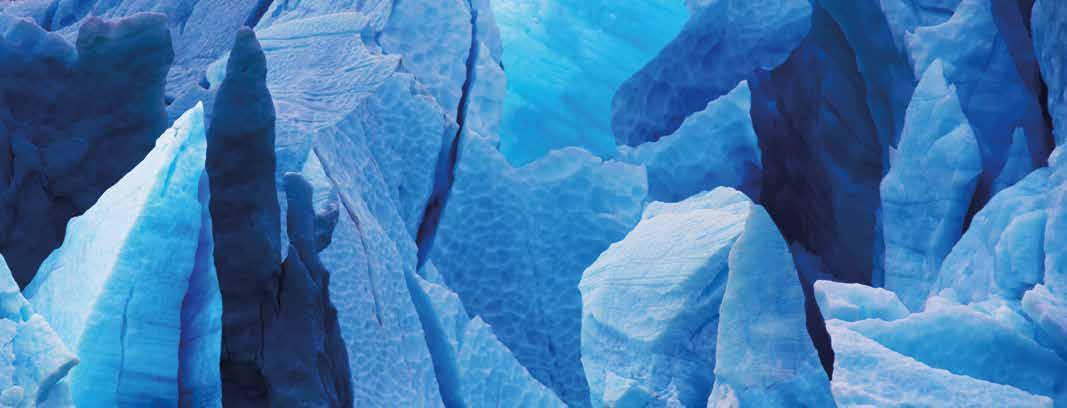
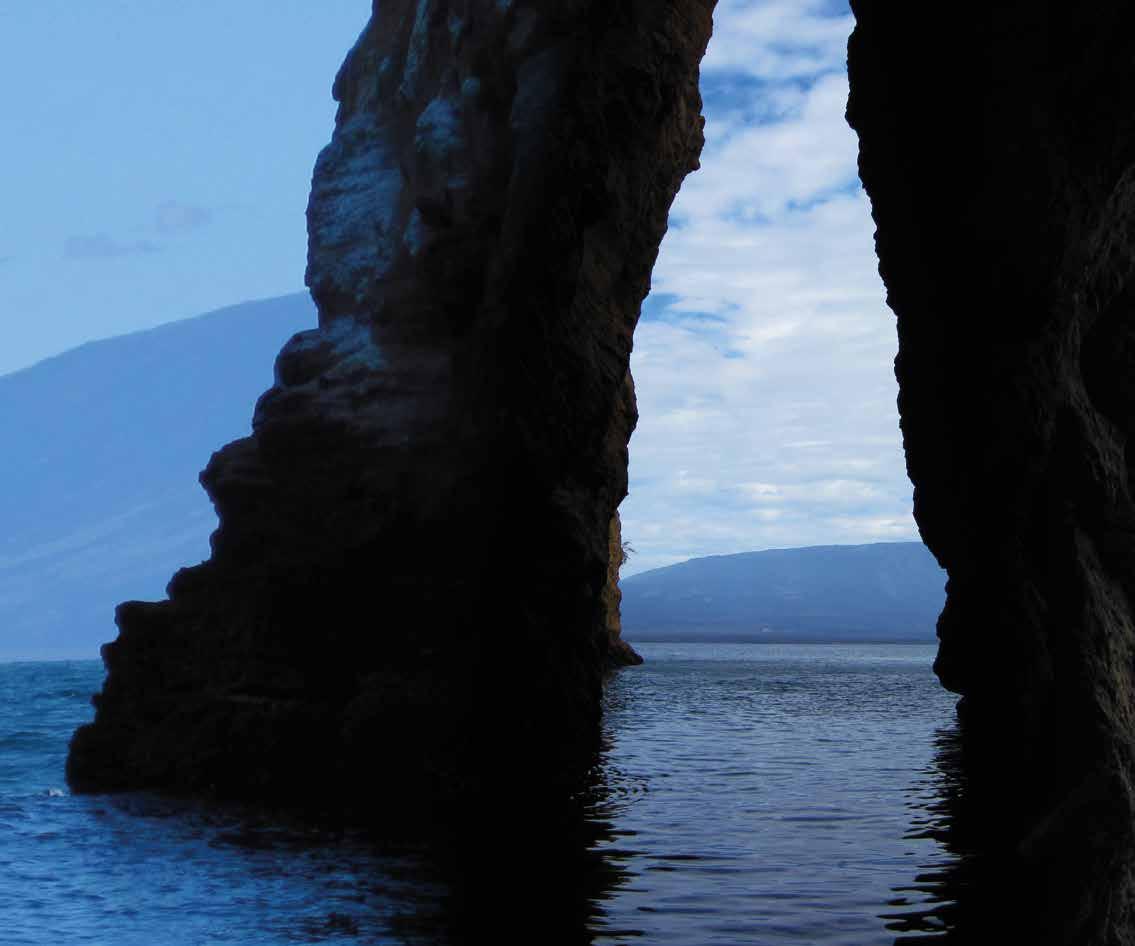
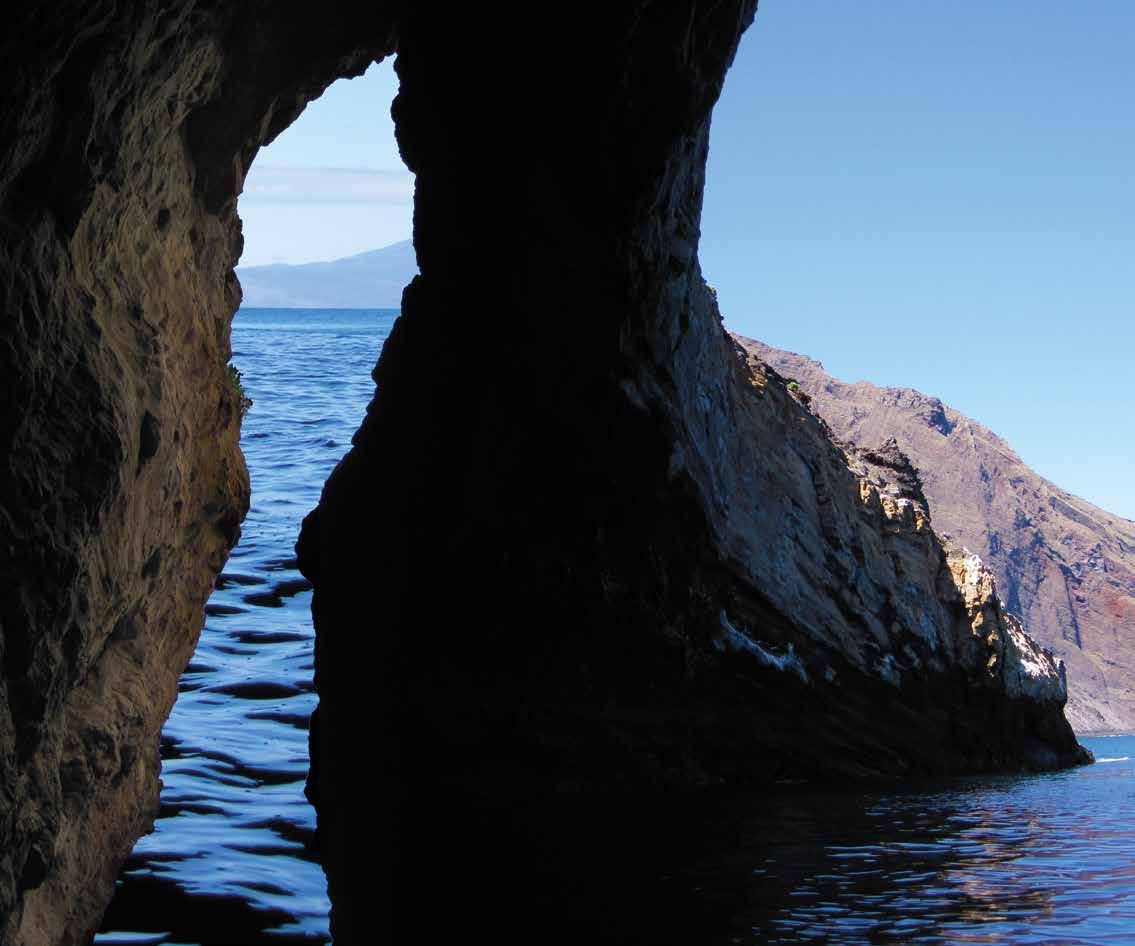
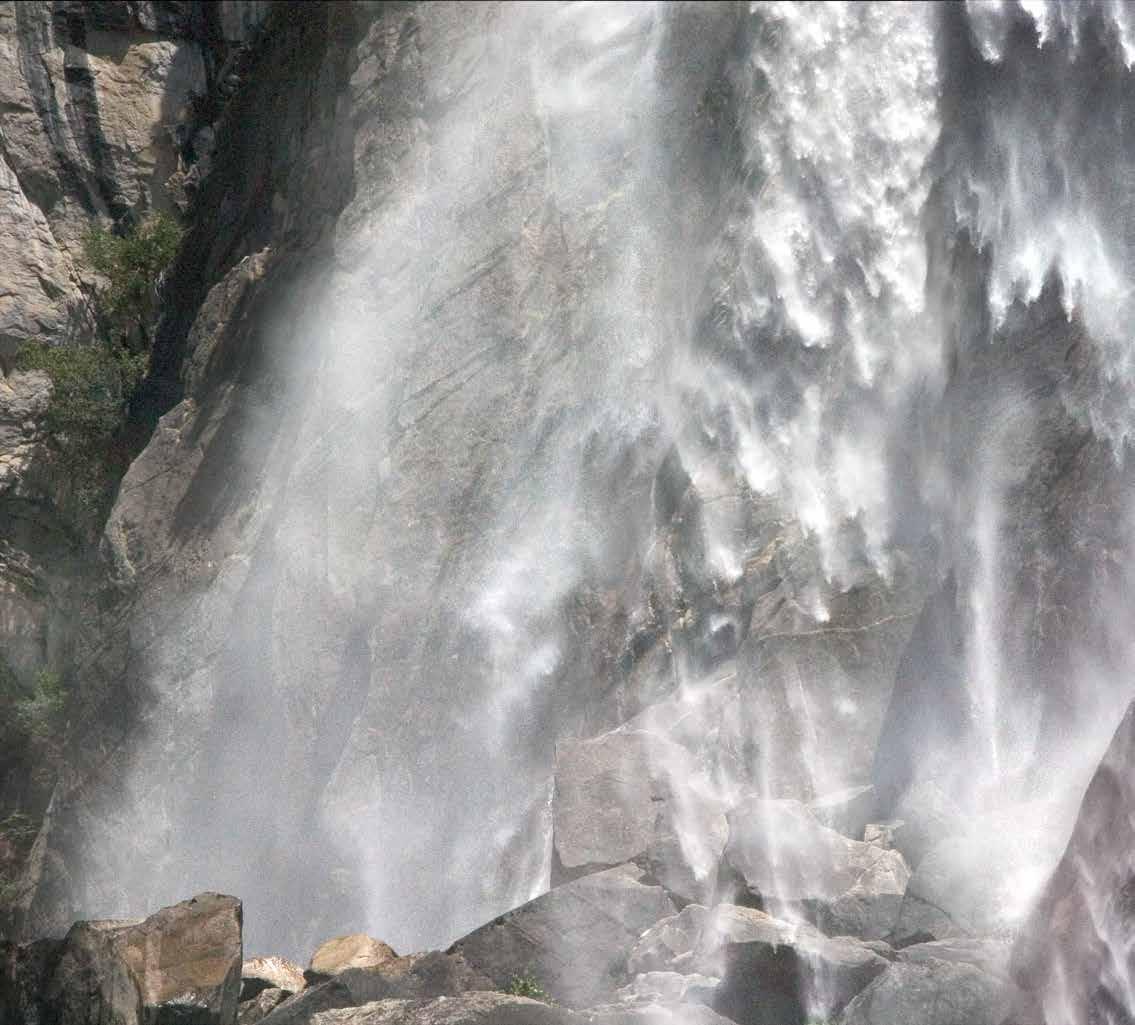
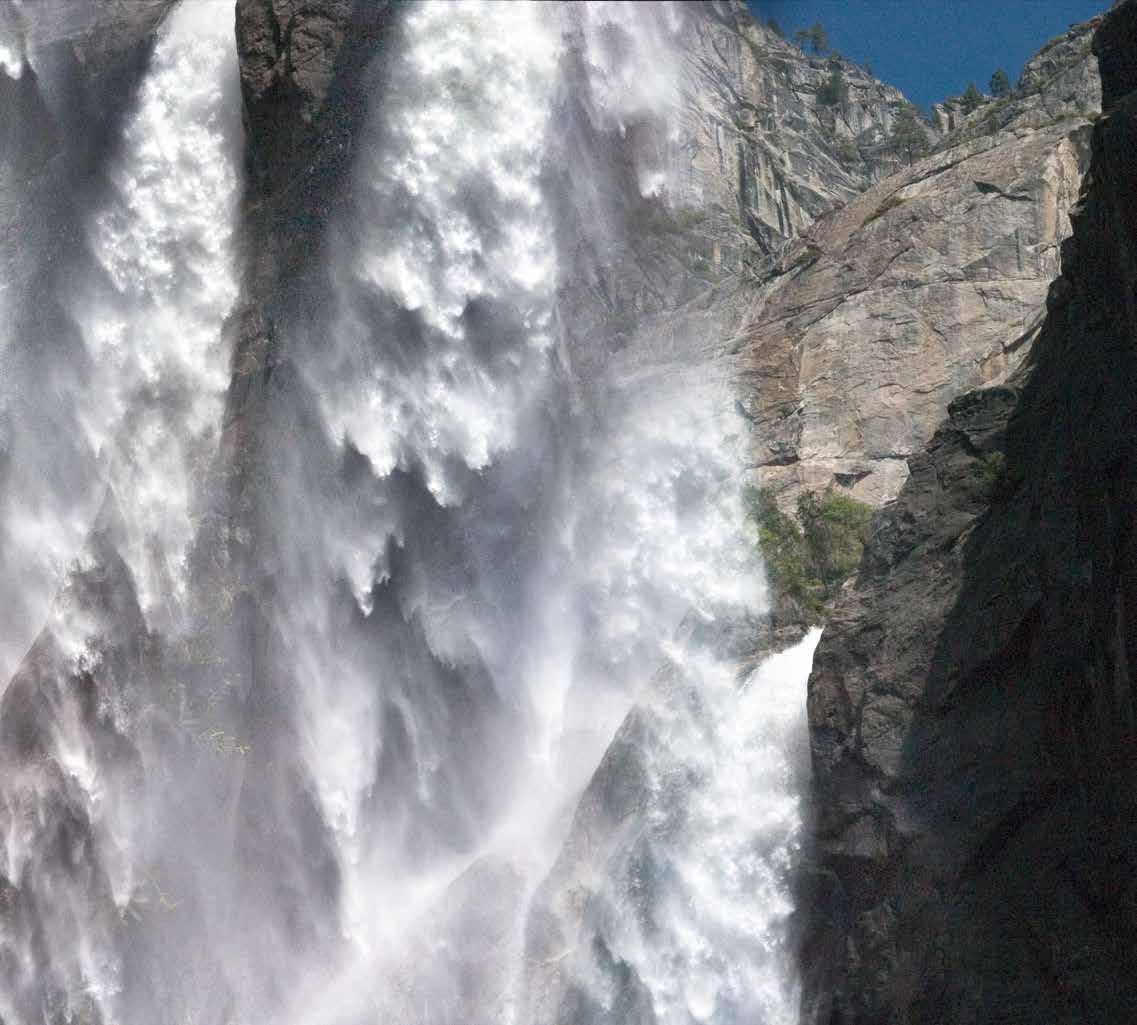
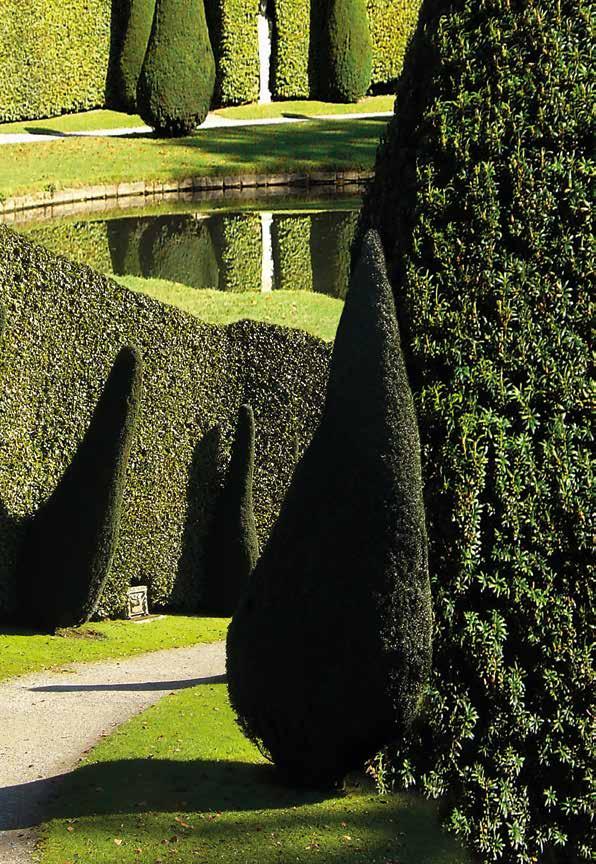
The trajectory of photography took a dramatic shift around the 1970s. Partly influenced by the advent of Conceptual Art, which questioned the nature of art-making itself, photographers explored and experimented with the physical properties inherent in the photographic process. Perhaps most importantly, they questioned what seemed to be an accepted belief that photographs told “the truth.” Even the word “photographer” was changed to “photo-based artist” in order to suggest the new range of possibilities. These artists recognized that photographs were actually an invented reality, and they began to stage their images in the studio, or within the camera itself.
Jenny Okun’s layered exposures create a synthetic Cubist approach to building a landscape. Since her original method involved advancing the film by small increments in order to create multiple exposures, her images included overlapping areas of overexposure, thus reminding the viewer of the process and properties of the medium. Now, Okun digitally seams her work together and, though we are culturally attuned to this type of practice, her works inject either a fine imbalance, or an odd sense of reconstructed harmony into what we believed to be a “real” landscape. Her work has always defined the point that landscapes do not exist in nature, but only in our minds.
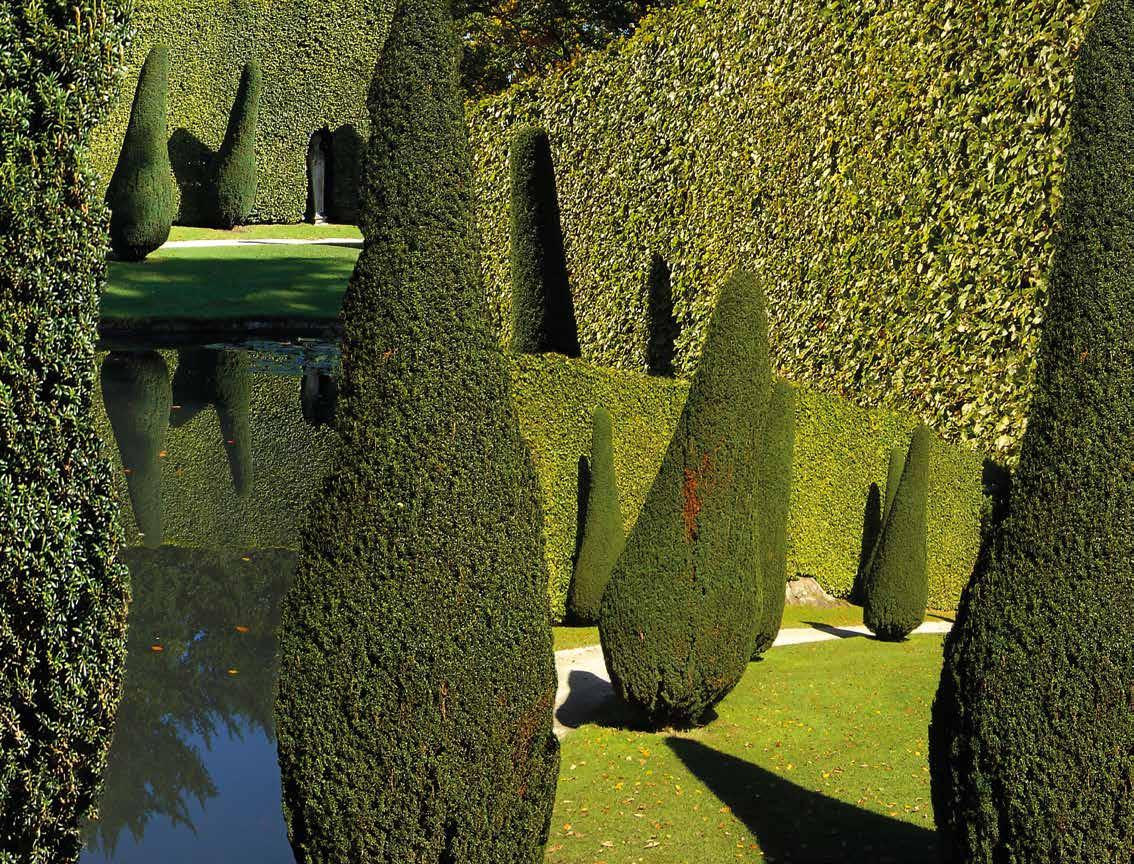
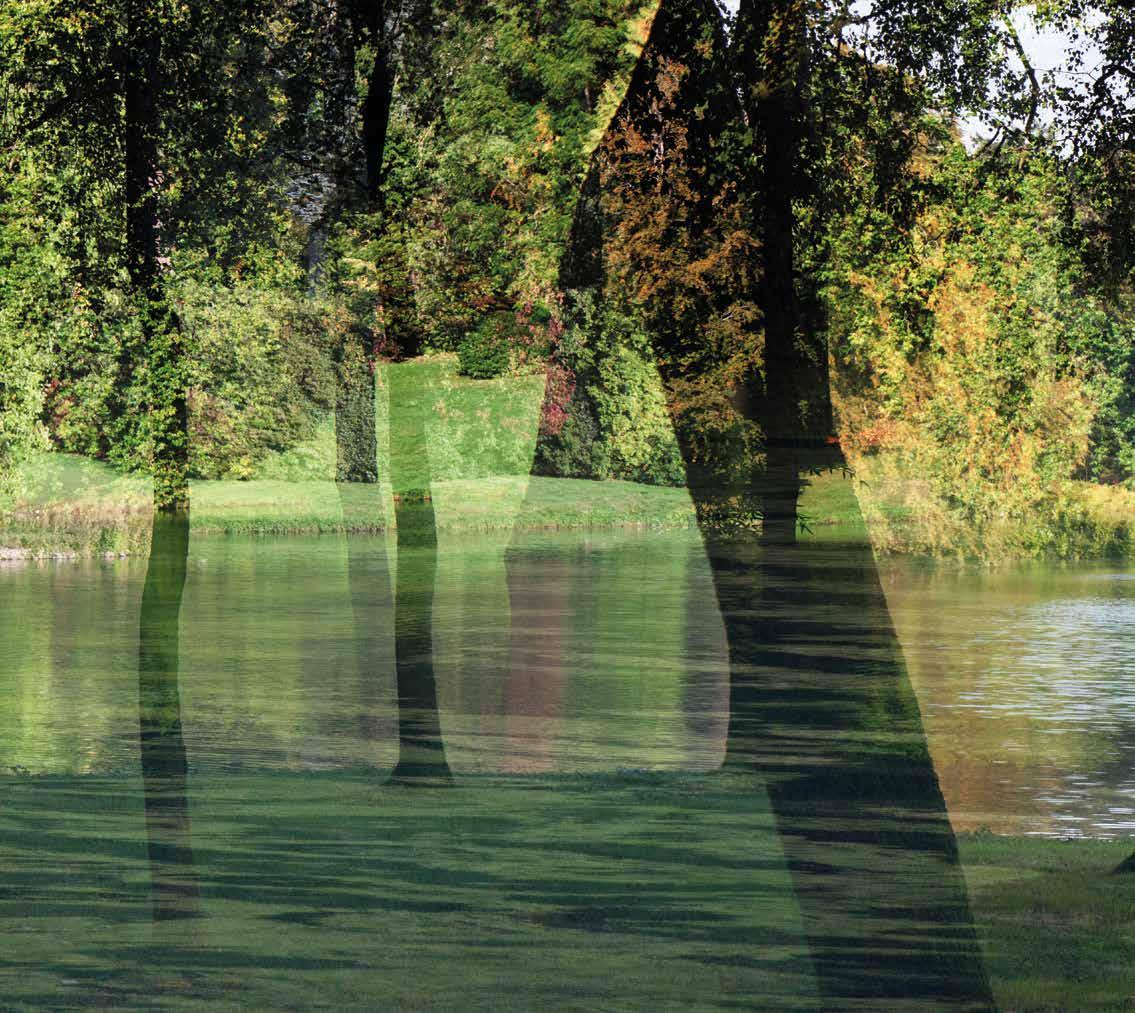
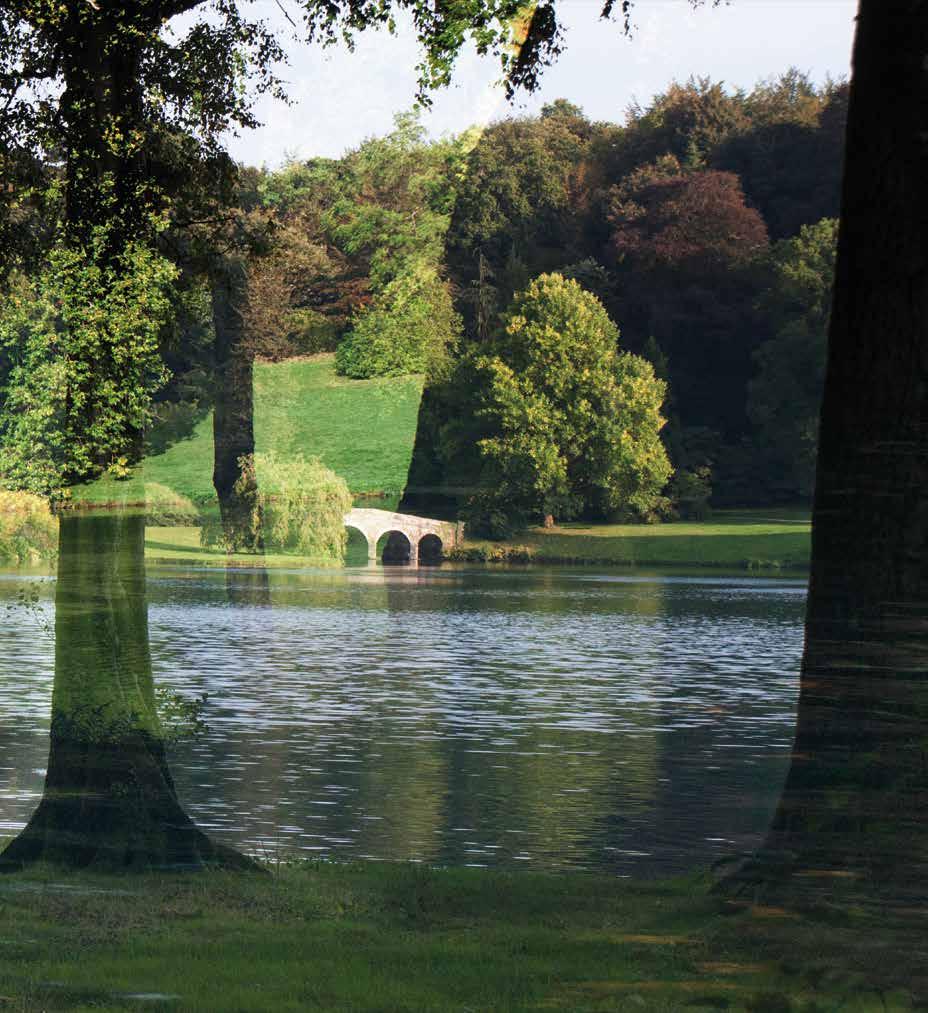
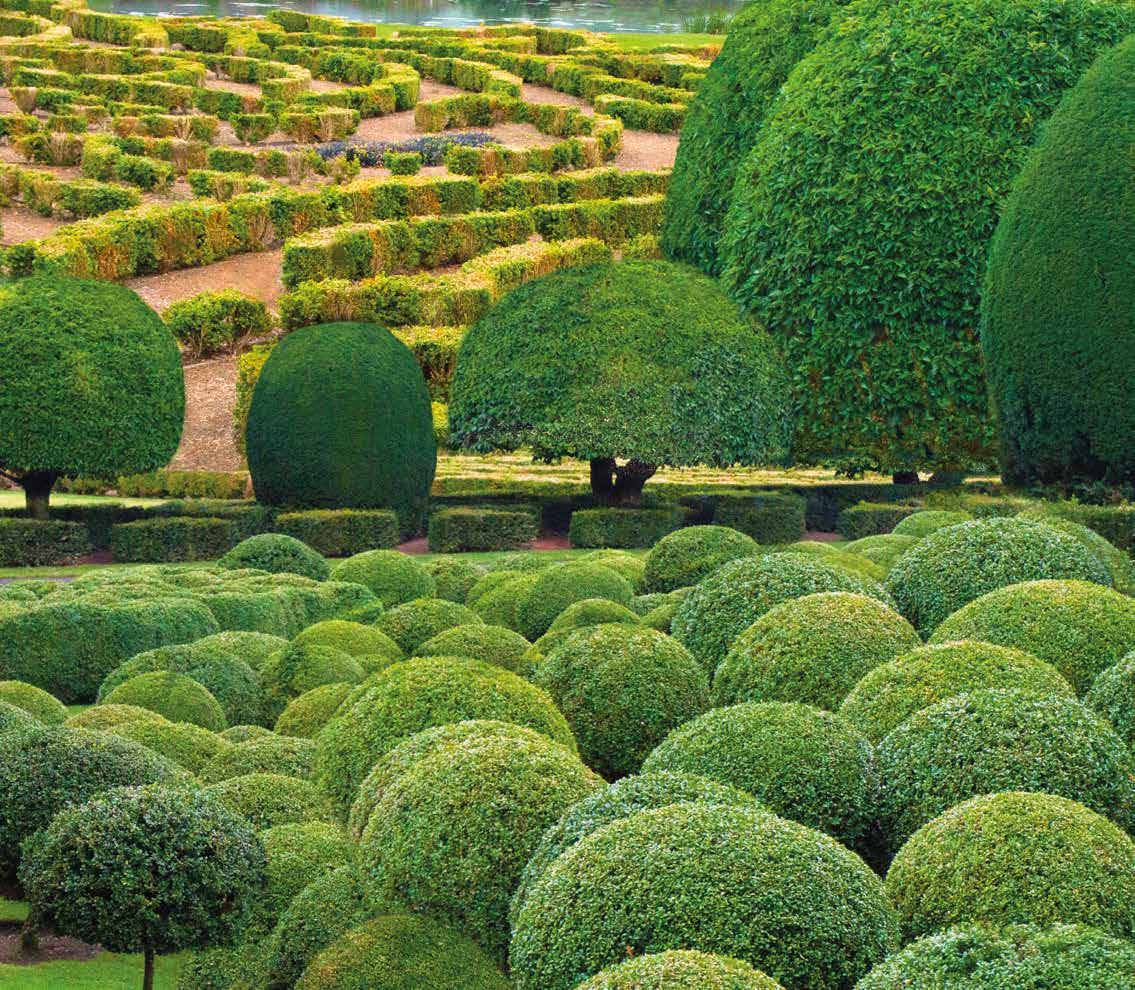
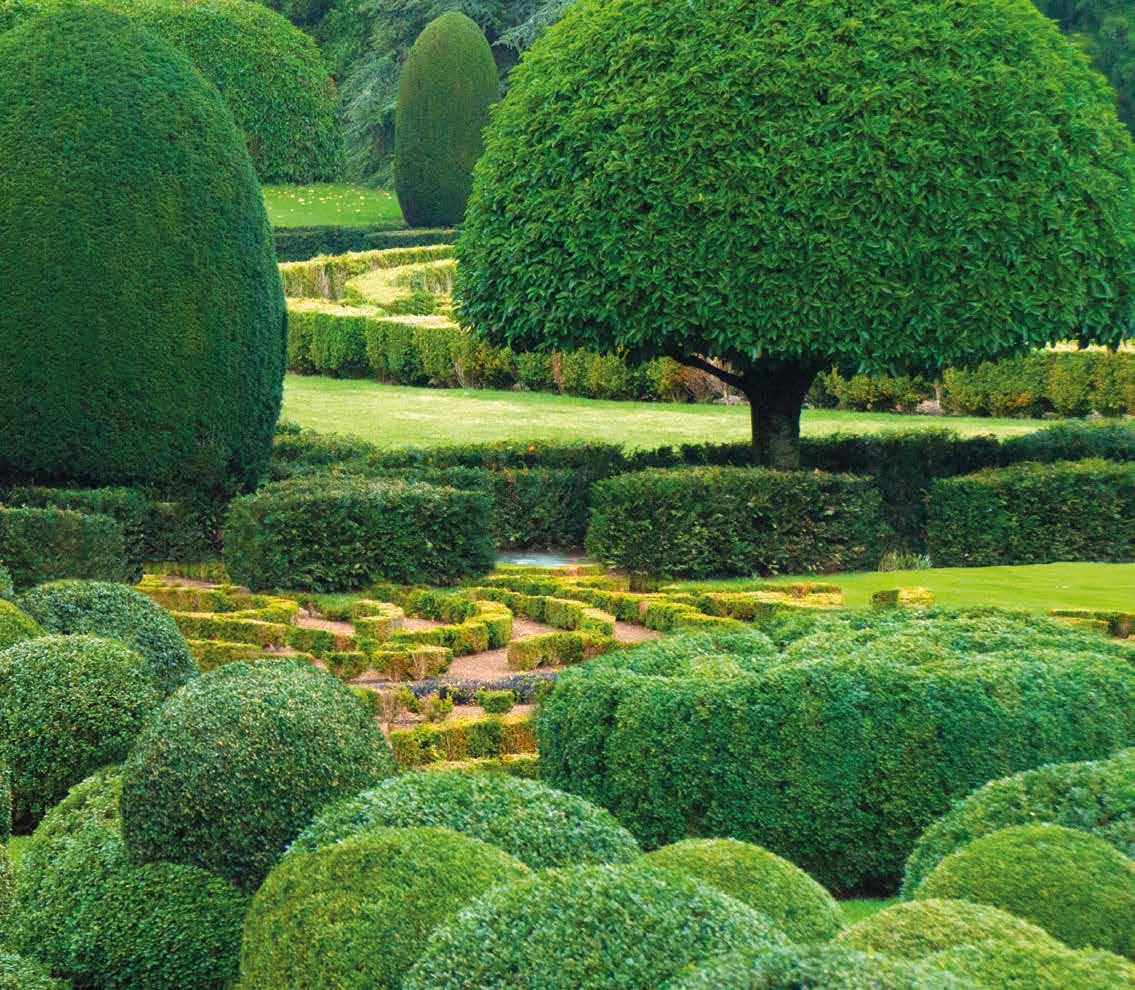
I am a painter at heart, an abstract painter who reveals where the abstraction originates. I am a filmmaker who always wants to show eye movements. I am a dyslexic who is comfortable with chaos and likes puzzles. I am a photographer who loves the details. I am an emotional thinker.

I made many artworks using architecture mostly because the experience was extremely linear and obvious. With landscapes, my interpretations are more subtle and usually there are no hard edges. I start by looking through the camera and taking photographs as my eye examines the subject. Later, in my studio, I roughly organize the images in overlapping layers in Photoshop. Then I start refining the images within the layers with the paintbrush tool. Sometimes it takes 30 hours to get the artwork exactly as I want it. To me, this method adds time and emotions to what I saw.
Spindrift Cypress Silhouette 1 (layers) 2021
Spindrift Cypress Silhouette 1 California 2021
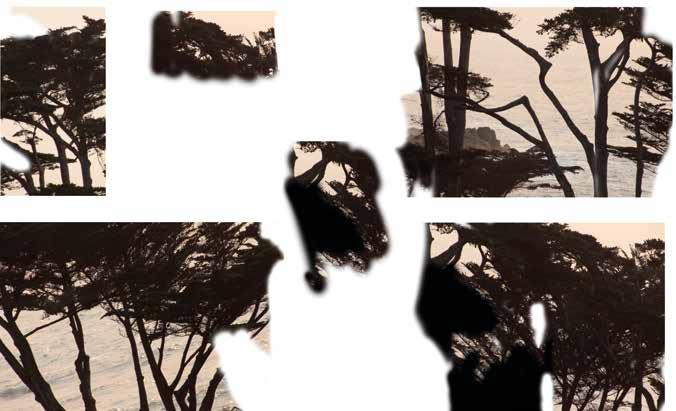
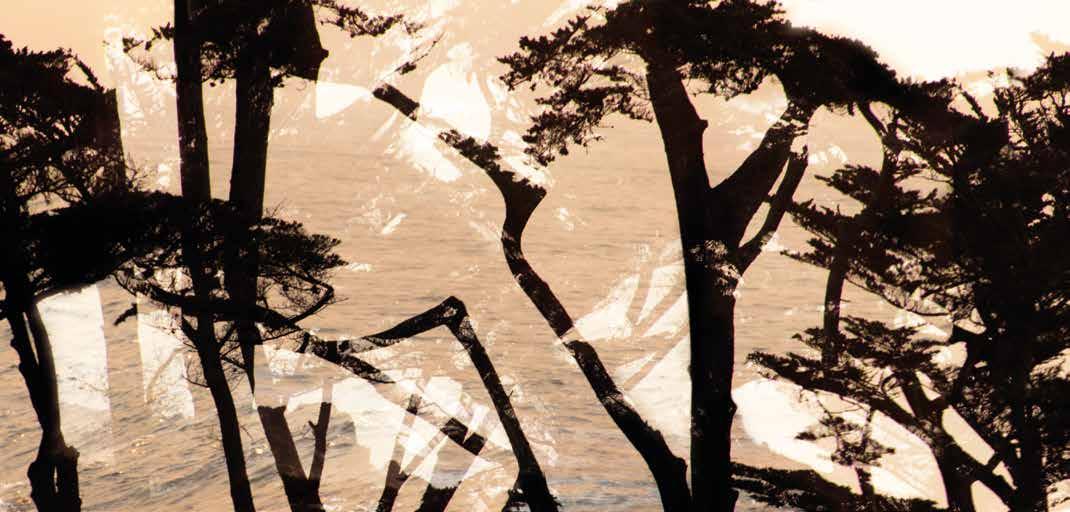
Some images I make magically blend together. It can be hard to distinguish the different layers in the final image. This image was made for the “Out of the Blue” exhibition in the LAX United Terminal. For this exhibition I decided to go for beauty over obvious process.
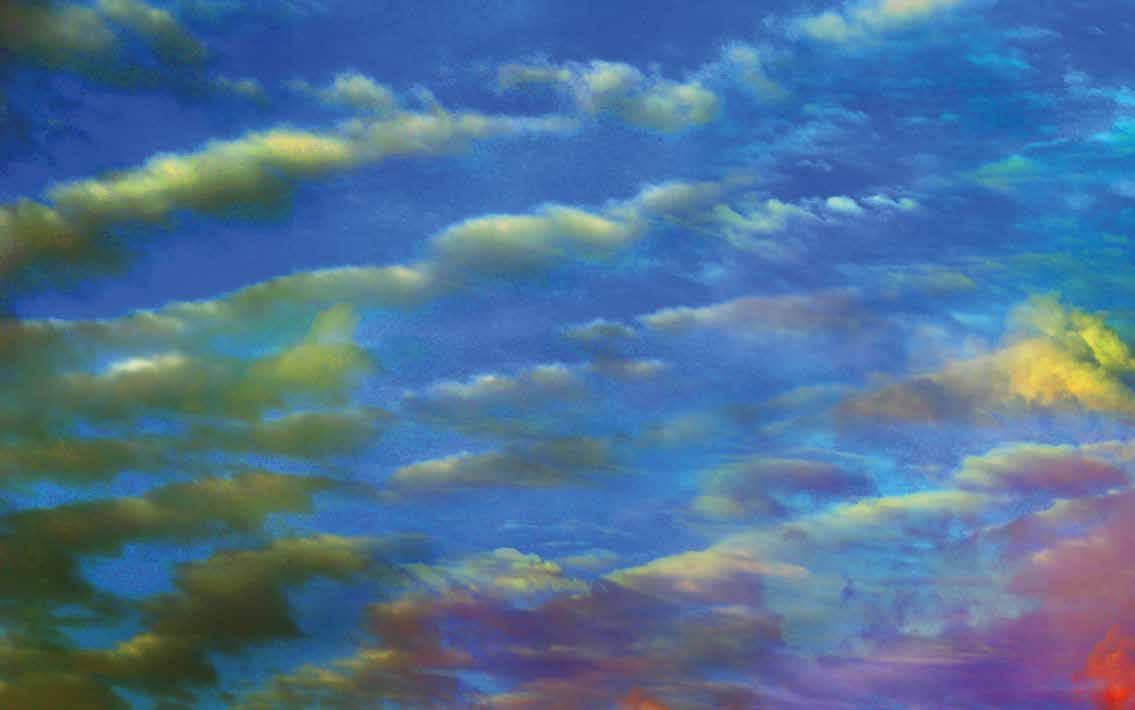
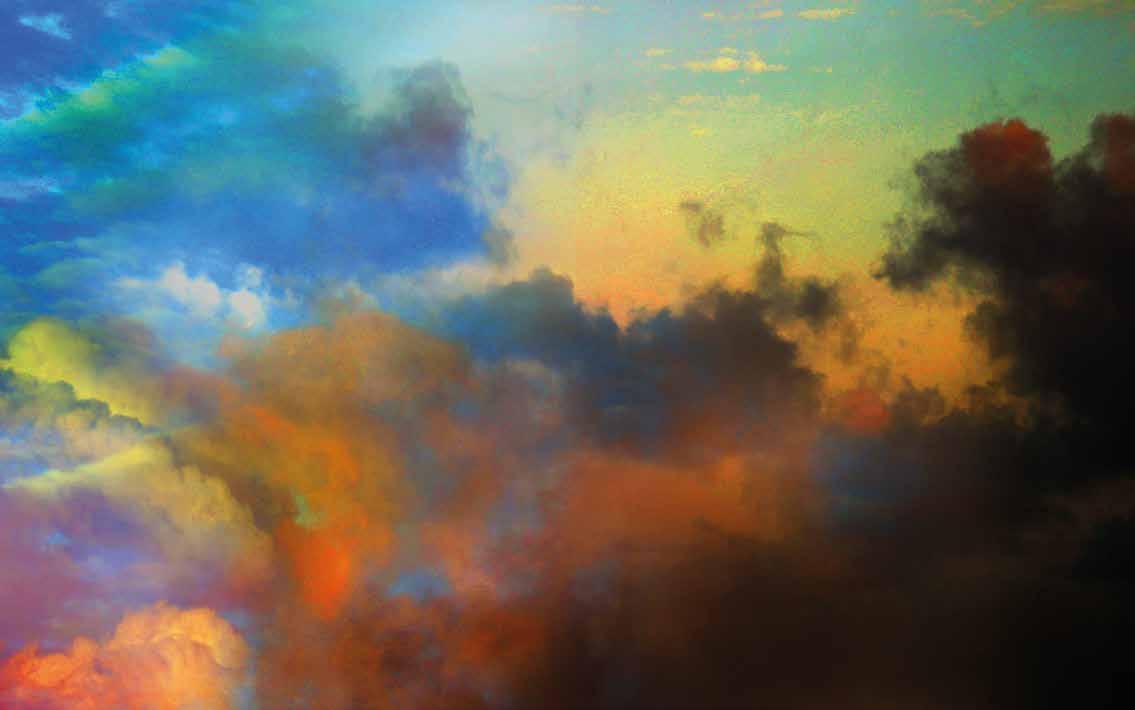
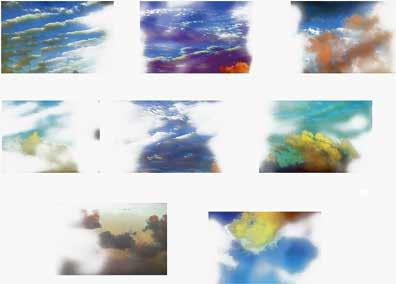
Albert Bridge London (drawing) 1985
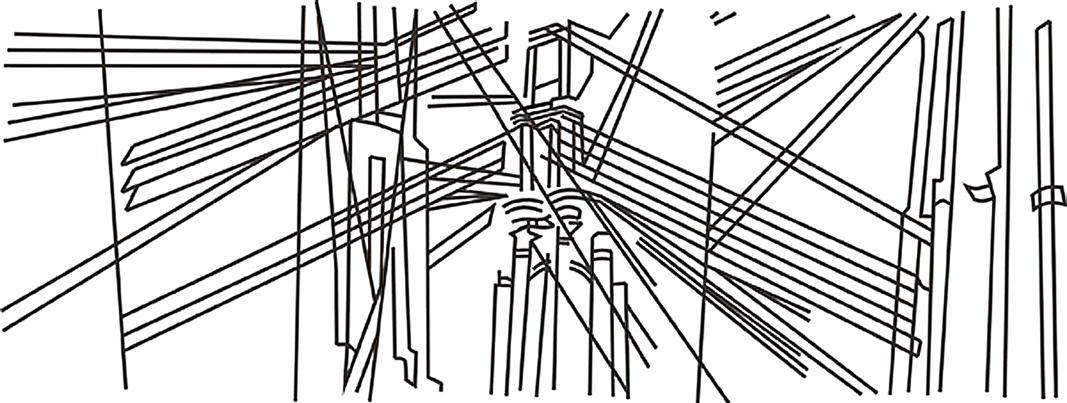
Albert Bridge London (in- camera) 1985
Albert Bridge London (charcoal drawing) 1985
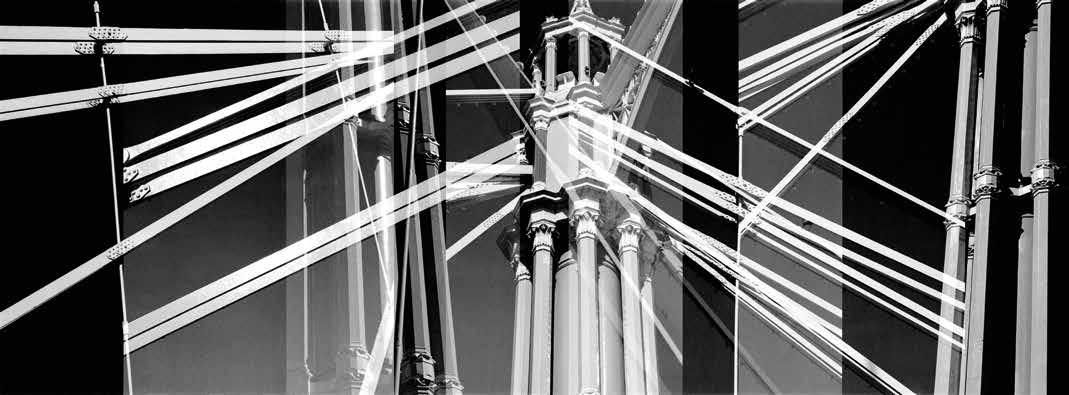
Before I started making digital images I made my layers “in camera” by advancing and exposing the film in the camera in small increments. This meant I had to return to the subject many times until I got the sequence perfect. I could not change the image once the negative was made. I had to sketch out the forms as a guide to help me choose the right order for the shoot.
Sometimes I would make charcoal drawings after the finished artwork.
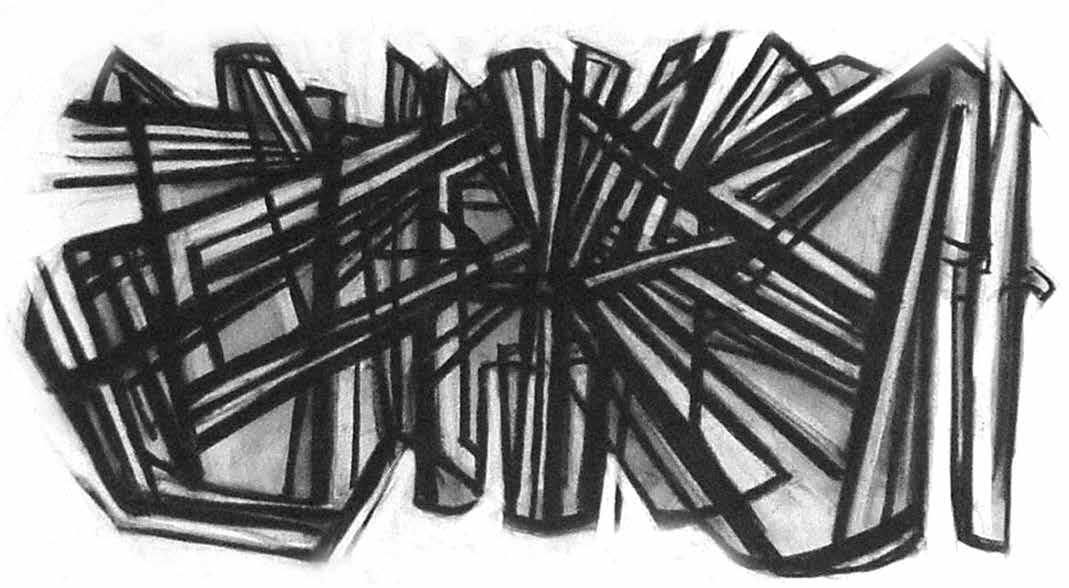
Now that I can use Photoshop I have more options for painting layers, so I need only one visit to a location where I take many shots. With more control I can make many more artworks with the left-over shots. Now I photograph carefully in the sequence that my eyes move. When you lose the vertical lines of the masked frame from the “incamera” shots you can produce a more coherent whole. It then takes the viewer longer to find the separate shots. The composition keeps your eye moving so you have time to examine all the parts.
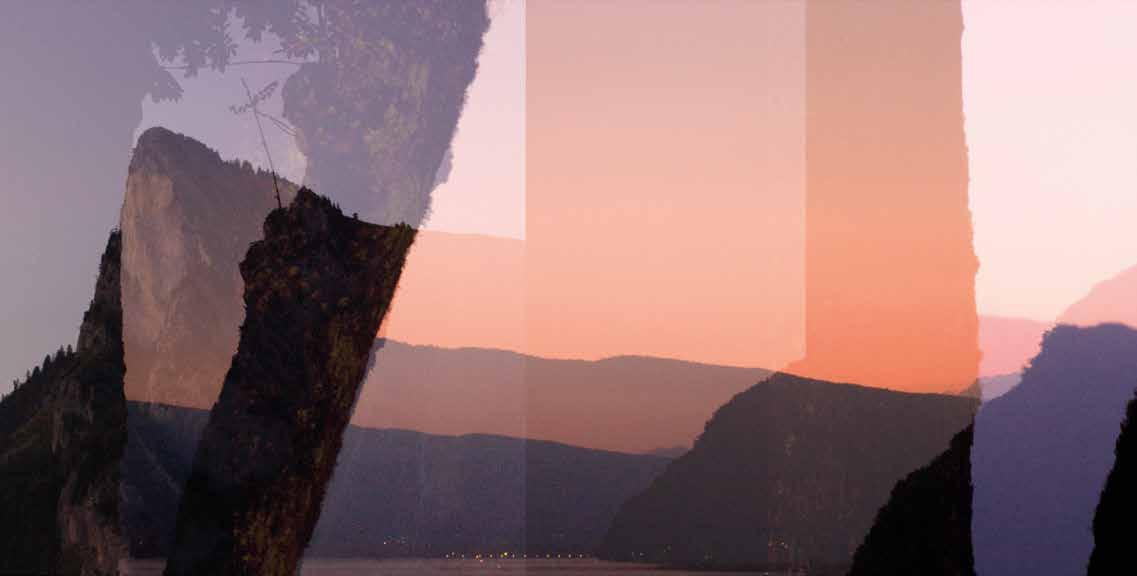
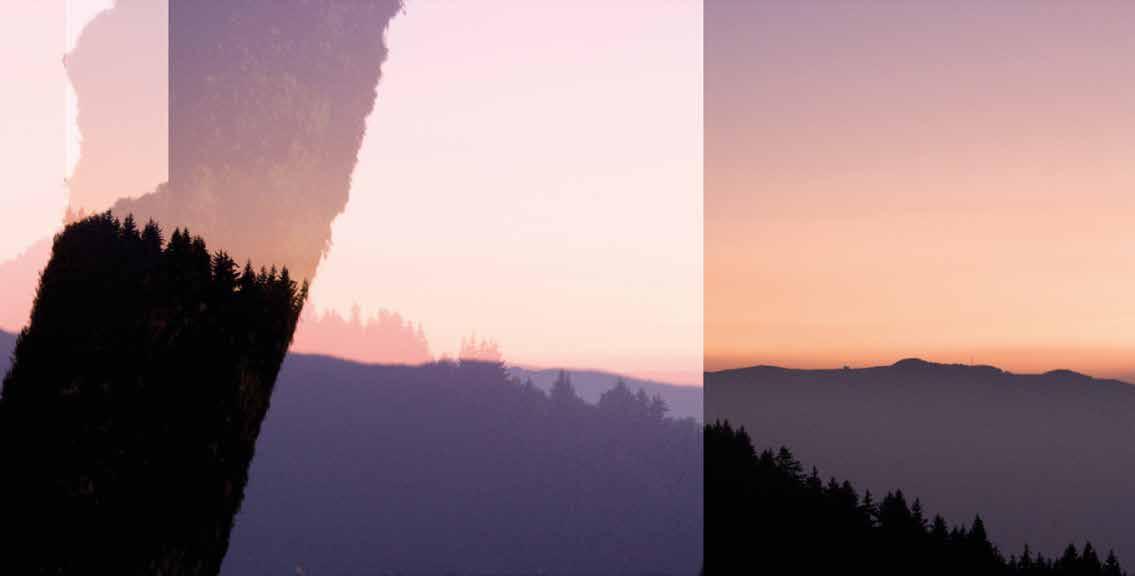
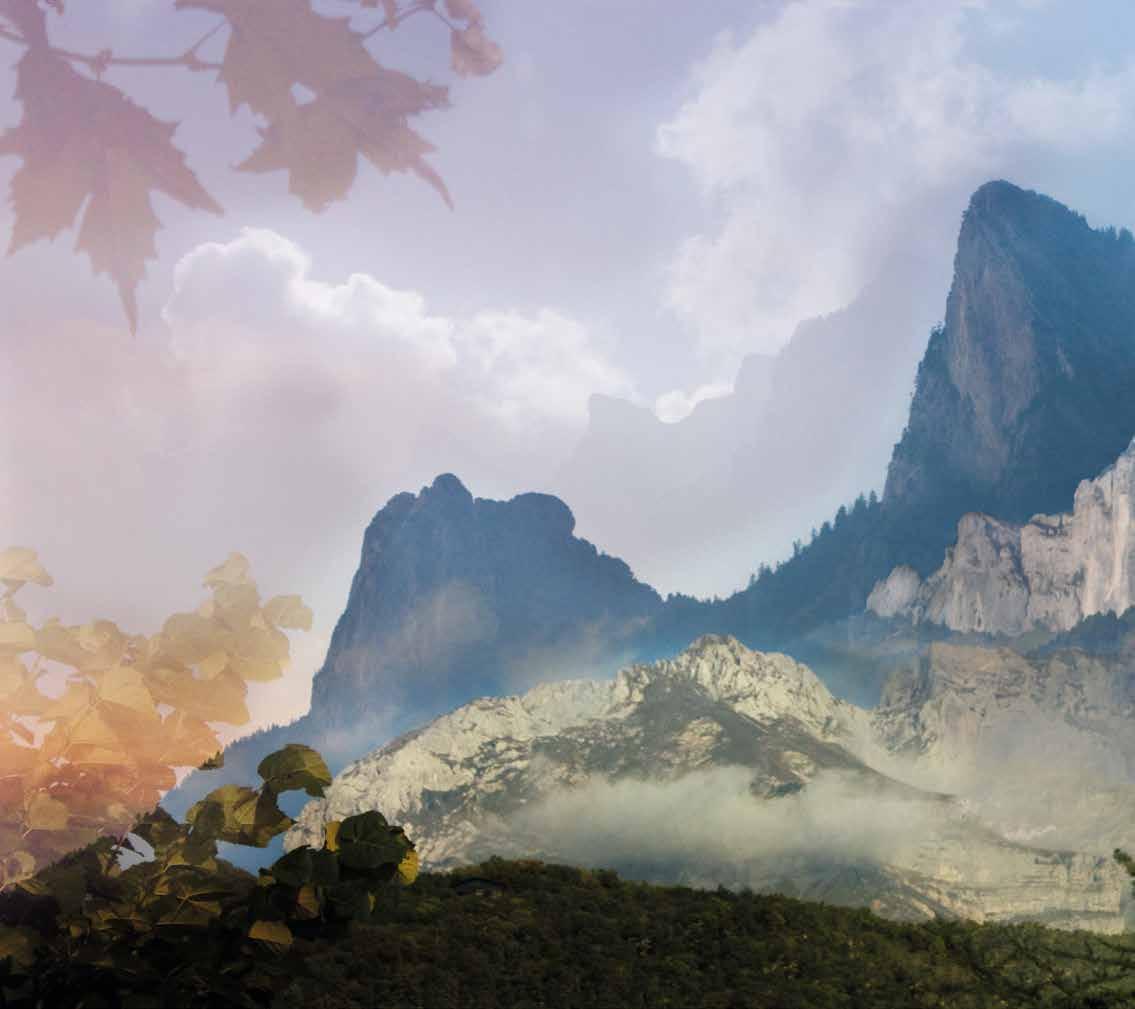
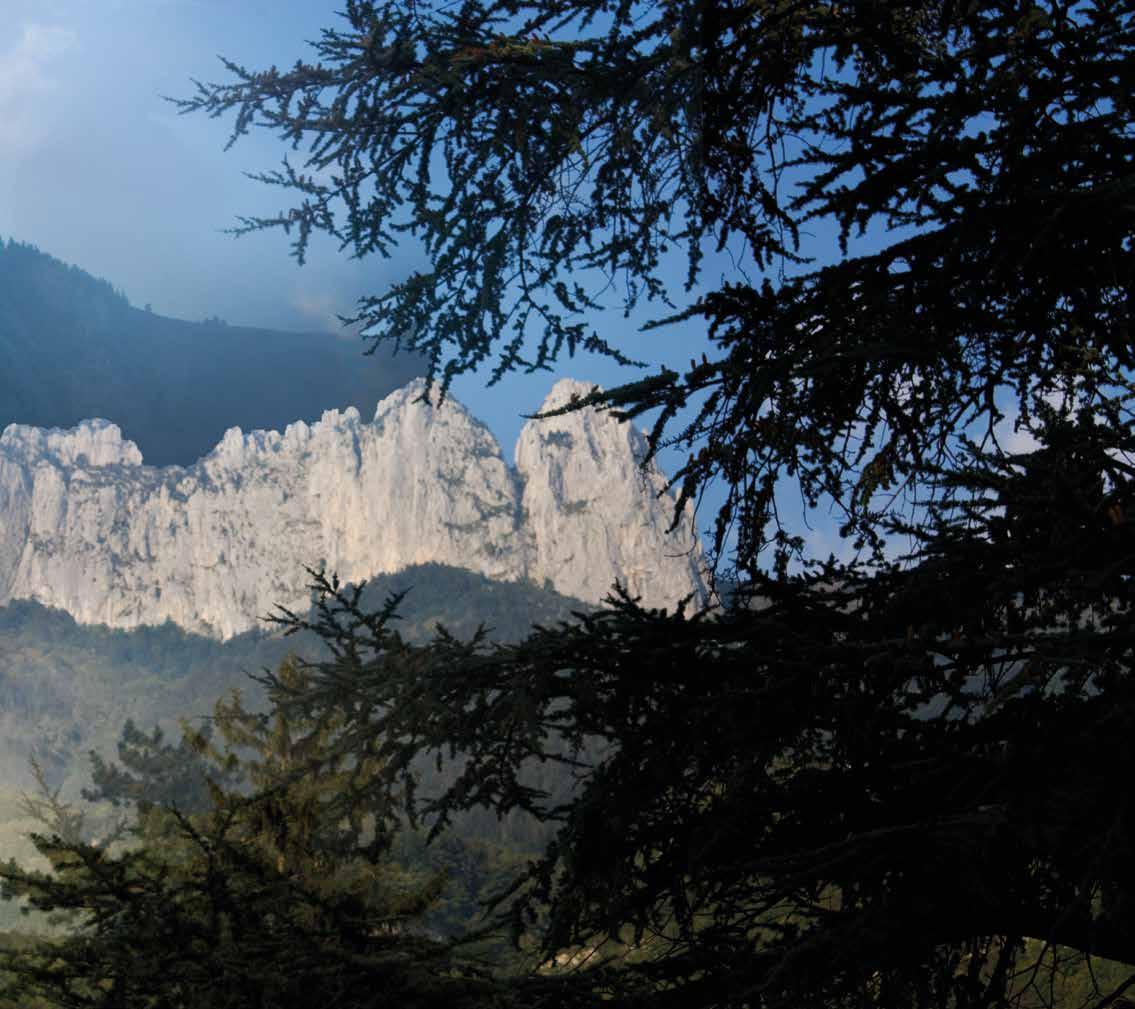
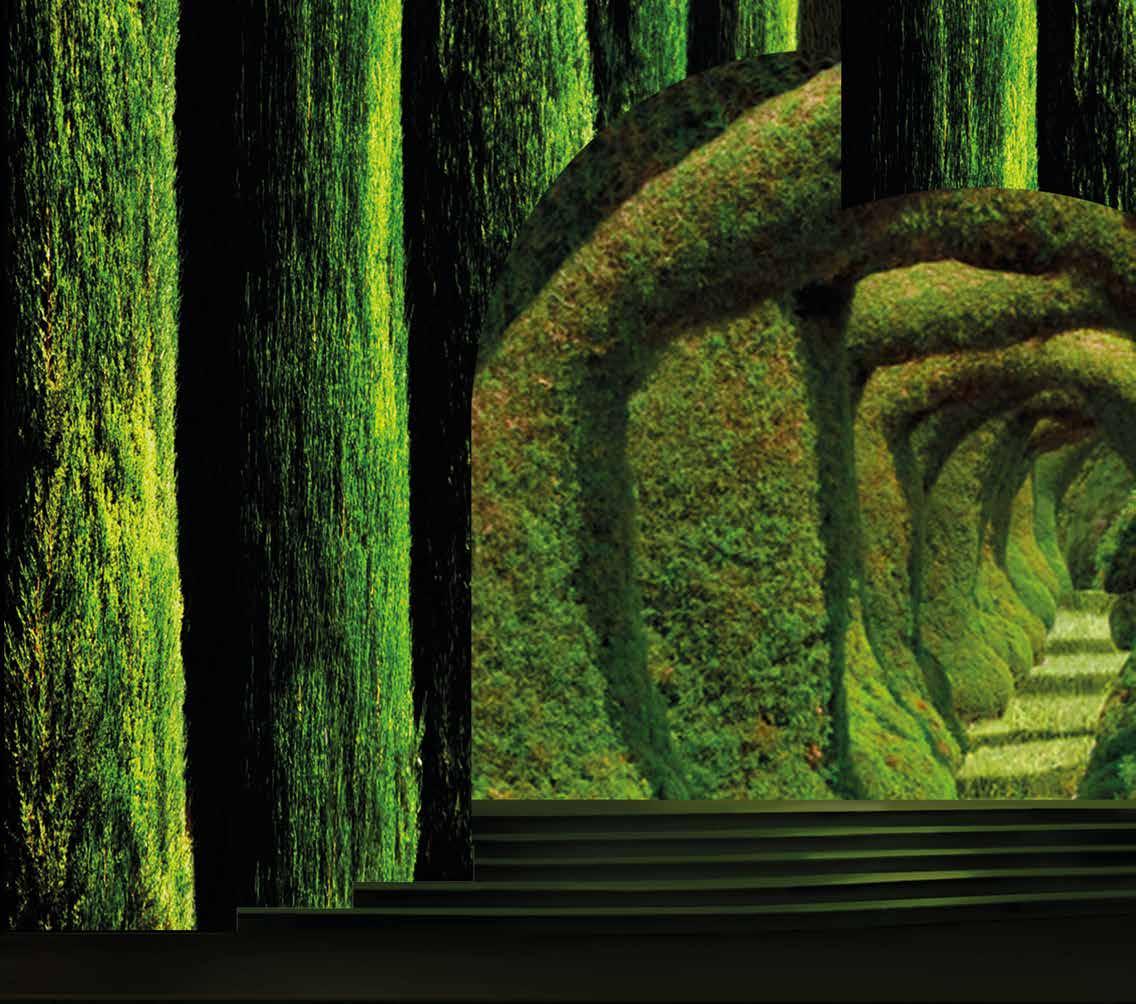
Recently I have been making sets for operas using photographic projections. The set below has three screens and steps for the singers to traverse through.
This image was from Dulce Rosa, an opera based on an Isabel Allende story, commissioned by Los Angeles Opera.
The left and right screens are from Spain and the rear screen image is from Costa Rica.
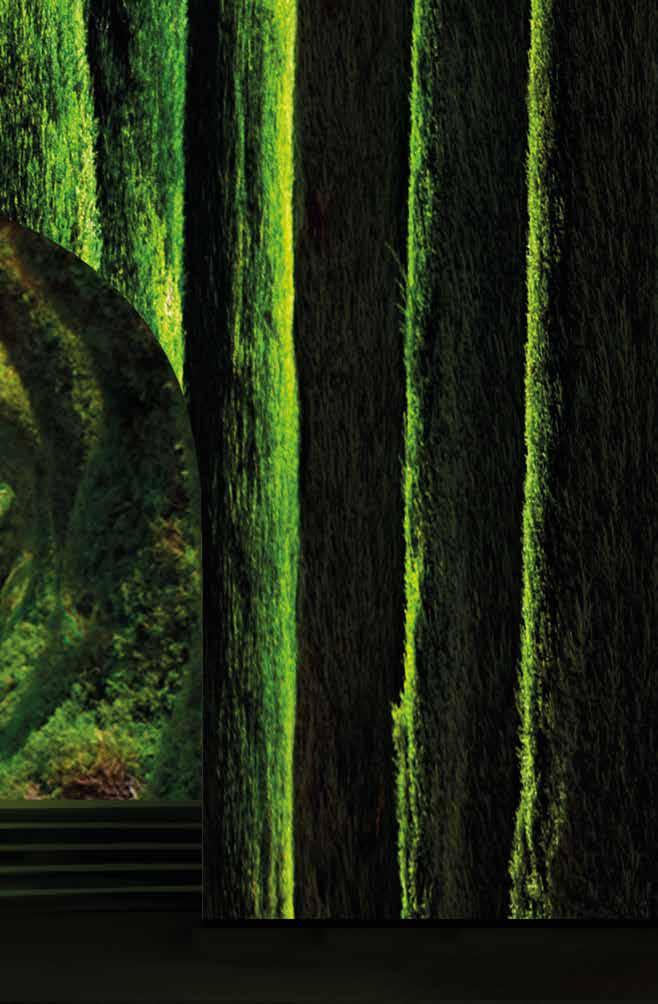
Michael Webb Hon. AIA/LA has authored 30 books on architecture and design, most recently Architects’ Houses and Building Community: New Apartment Architecture, as well as a memoir, Moving Around: A Lifetime of Wandering, while editing and contributing essays to a score of monographs. He is also a regular contributor to leading journals in the United States, Asia and Europe. Growing up in London, he was an editor at The Times and Country Life, before moving to the U.S., where he directed film programs for the American Film Institute through the 1970s and curated a Smithsonian exhibition on the history of the American cinema. He now lives in Los Angeles in the Richard Neutra apartment that was once home to Charles and Ray Eames.
Craig Krull is a gallerist who first established Turner/Krull Gallery in West Hollywood in 1991. During the gallery’s three years on Melrose Avenue, the program was exclusively photo-based. In 1994, Craig Krull Gallery became one of the founding galleries at the new Bergamot Station Art Center. Since that time, the gallery has expanded its scope and it now represents major Southern California artists such as Carlos Almaraz, Jo Anne Callis, Peter Alexander, Dennis Hopper, Julius Shulman and Jenny Okun.
is represented in numerous private and public collections. Commissions have included the J. Paul Getty Museum, the Tate Modern, and the Whitney Museum of American Art. Craig Krull describes her artwork as “large-scale color photographic abstractions. Okun distills the essential qualities of form, texture, color, and detail into one layered vision.”
Griffith Rhys Jones OBE is a British comedian, writer, actor, and television presenter. Griff came to national attention for his work in the BBC television comedy sketch shows Not the Nine O’Clock News and Alas Smith and Jones. With Mel Smith, he co-founded the television production company Talkback Productions and he established the production company Modern Television. Rhys-Jones has participated in hundreds of films and television programs and he is a multiple-award-winning stage actor. He has published award-winning travel books and memoirs and is President of the Victorian Society and Civic Voice. Around 2011, he bought a 1948 57-foot (17 meter) wooden yacht, Argyll, which he races at regattas, including the Fastnet Race. Rhys Jones is a gold medal winner from the RORC.
premiere 1995 at the Virginia Opera) and Pontalba (2003). In 2008, her 80th birthday was marked by premieres of Points of View, Green, Cantilena, Taking Turns and other performances. In 2018, coinciding with Musgrave’s 90th birthday, her compositions were performed at the Edinburgh International Festival and the BBC Proms. Musgrave’s “Trumpet Concerto” for Alison Balsom had its US premiere at the Hollywood Bowl in 2021.
Richard Sparks is an English-born comedy writer, lyricist, librettist, author and director living in Los Angeles. He has written extensively for television, film, radio and the stage as well as theater and opera. His opera libretti include original works, mostly commissioned by the Los Angeles Opera, and translations/ adaptations of Classic operas. He is the author of several books.
Jenny Okun is an American artist with studios in London and Los Angeles. Her artwork has been shown in more than 60 international exhibitions, and
Thea Musgrave CBE is a Scottish composer of opera and classical music. She has lived in the United States since 1972. She has written more than a dozen operas and other musical theater works, many taking a historical figure as their central character; among them Mar y, Queen of Scots (197 7), Harriet Tubman (Harriet, the Woman called Moses, 1984), Simón Bolívar (1993;
Lee Holdridge is a Haitian-born American composer, conductor, and orchestrator. An 18-time Emmy Award nominee, he has won two Primetime Emmy Awards, two Daytime Emmy Awards, two News & Documentary Emmy Awards, and one Sports Emmy Award. He has also been nominated for two Grammy Awards. Holdridge has composed music for 36 film and TV shows.
Kathy Lette has written 20 books, including 14 best-selling novels, the latest of which is Till Death – or a little light maiming – Do Us Part. She is published in over 17 languages. Her books have been made into films, TV series and an opera. She also works as a TV presenter and a travel writer. After touring Britain
and Australia with her one woman show, “Girls Night Out,” she is pleased to report that she didn’t fall out with the cast. Kathy is an autodidact (clearly, it’s a word she taught herself) but has three Honorary Doctorates. She lives in Sydney and London where she can often be found at The Savoy Hotel drinking a cocktail named after her, during her time as writer in residence. www.kathylette.com @kathylette
@kathy.letteJames Forrest is an English adventurer, hiker and author from Birmingham, England. His delightful book of his adventures is Mountain Man: 446 Mountains. Six Months. One record-breaking adventure. In 2017 Forrest broke the record for the fastest known completion of all 446 mountains in England and Wales. He climbed every 2,000 foot mountain in England and Wales, peaks known as the ‘Nuttalls,’ in six months, walking over 1,000 miles in the process. In 2018 Forrest climbed all 273 mountains in Ireland and Northern Ireland in eight weeks, the fastest known time. He walked over 1,000 kilometers and climbed the height of Everest every week for eight weeks in a row in his mission to climb the so-called Vandeleur-Lynams, every mountain in Ireland and Northern Ireland over 600 meters.
Steven Reich is an Emmy Award-winning writer and producer, known for dozens of documentaries on KCET, PBS/NOVA, Discovery, National Geographic and more–along with indie films that include: Circuitry Man, One False Move and Shakes the Clown He serves on the Board of Directors of Ocean View Farms Community Garden.
Caleb Leech is a landscape gardener based in Rhode Island. He is the former horticulturist-in-charge of The Met Cloisters Gardens, a branch of the Metropolitan Museum of Art devoted specifically to the art, architecture and gardens of the Middle Ages. Prior to working at the Met, he was a curator at the Brooklyn Botanic Garden in charge of the Herb and Vegetable Garden. He is particularly interested in the connections people feel with plants and gardens. @caleb_leech
of the Garden Museum.
@taniacompton
Gus Christie (Executive chair and owner of Glyndebourne)
Annie Gatti is an award-winning garden writer based in the UK. She is currently specializing in all things related to gardens and gardeners with a particular interest in eco-friendly gardening. Gatti won the Garden Media Guild Environment Award in 2011. Gatti is co-author of the RHS Your Wellbeing Garden
Tania Compton (Garden designer, writer and plants-woman) Tania has experimented with the mix of formality and wilderness to create impressive lowmaintenance gardens in big spaces. Tania produced a coffee-table book The Private Gardens of England, featuring 35 gardens, and Dream Gardens: 100 Inspirational Gardens with Andrew Lawson. With Roger Malbert she contributed to The Wirtz Private Garden. Essays about art and landscape architecture were gathered for Beyond the Town: Conversations of Art and Land. Compton, an aficionado of natural dyeing, was the Garden Editor of British House and Garden for 12 years and is now contributing Garden Editor to The World of Interiors. She helps steer the programming committee as a Trustee
Gus graduated from King’s College, London, with a degree in zoology. He worked in various theaters before working as a cameraman for Partridge Films from 1989–91. He went freelance in 1991 and worked on various naturalhistory documentaries. His interest in natural history sparked an ambition to develop an environmental strategy for Glyndebourne. In 2004 Gus spearheaded a project to build a 67-meter wind turbine at Glyndebourne to power the Opera House via renewable energy. In the six years since the turbine was officially launched in January 2012, it has produced on average the equivalent of 102 percent of the organization’s annual electricity requirements, exceeding a target of 90 percent. Gus oversees other environmental initiatives and is active in enabling Glyndebourne to achieve its long-term ambition of becoming carbon neutral.
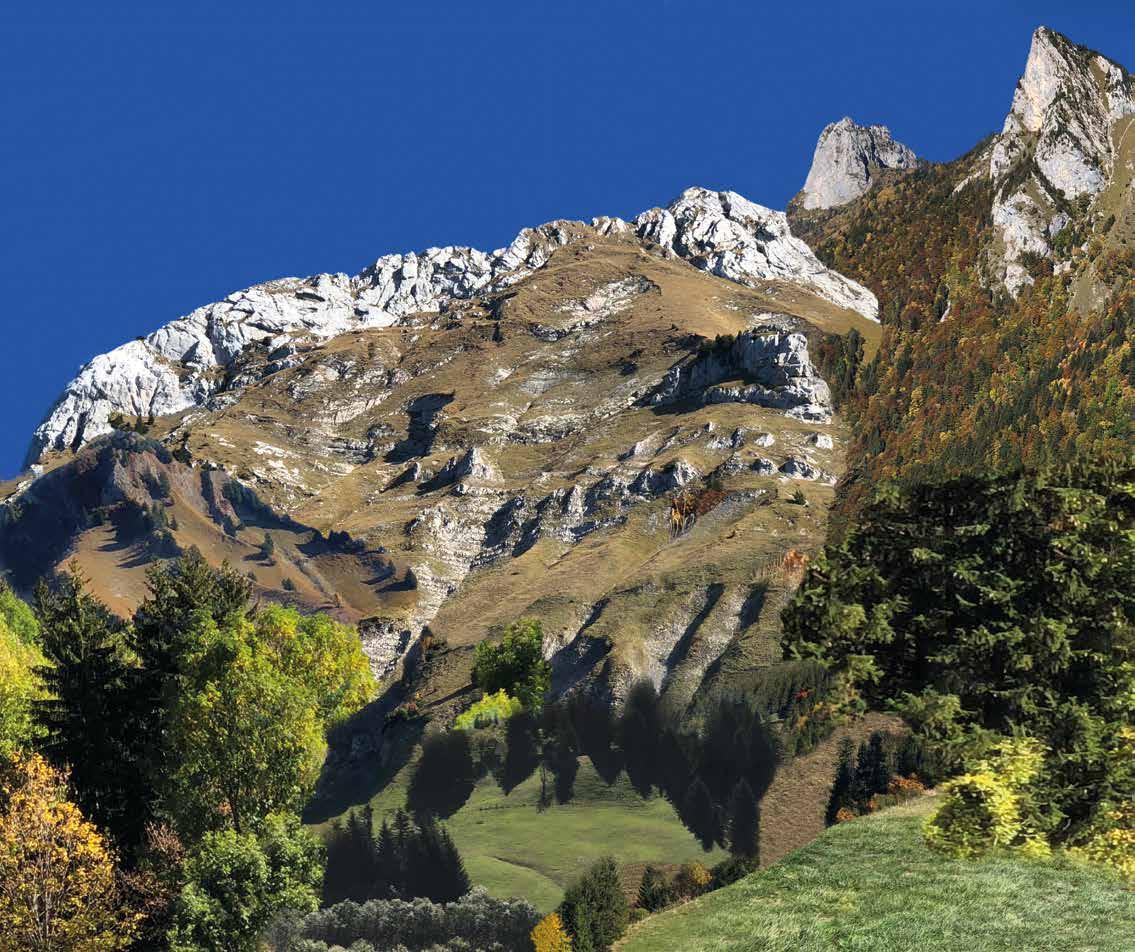
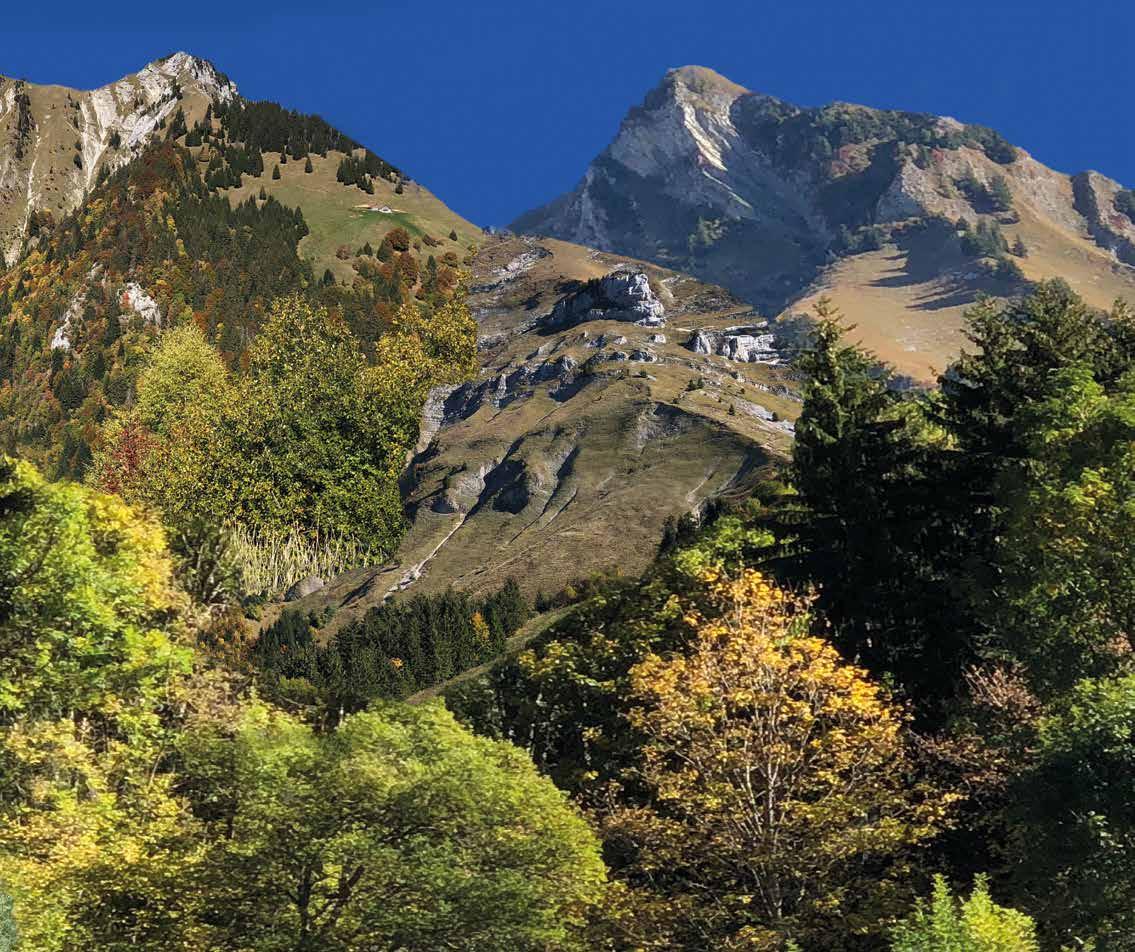
My grateful thanks to:
Michael Webb, who visited my studio one afternoon and suggested I make a book of my images of landscapes and wrote the introduction.
ORO Editions for taking me on and guiding me through the publishing labyrinth.
My gallerist, Craig Krull who has been a friend and mentor for many years.
My husband, Richard; daughter, Lizzi; and friends–Barbara Strasen, Joanna Kiernan and Olly Blackburn, who listened to me for a year or so about this project.
All of the contributors who wrote essays from the heart–Griff Rhys Jones, Thea Musgrave, Lee Holdridge, Kathy Lette, James Forrest, Annie Gatti, Steven Reich, Caleb Leech, Tania Compton and Gus Christie.
To all the happy hikers we have met traveling around our world.
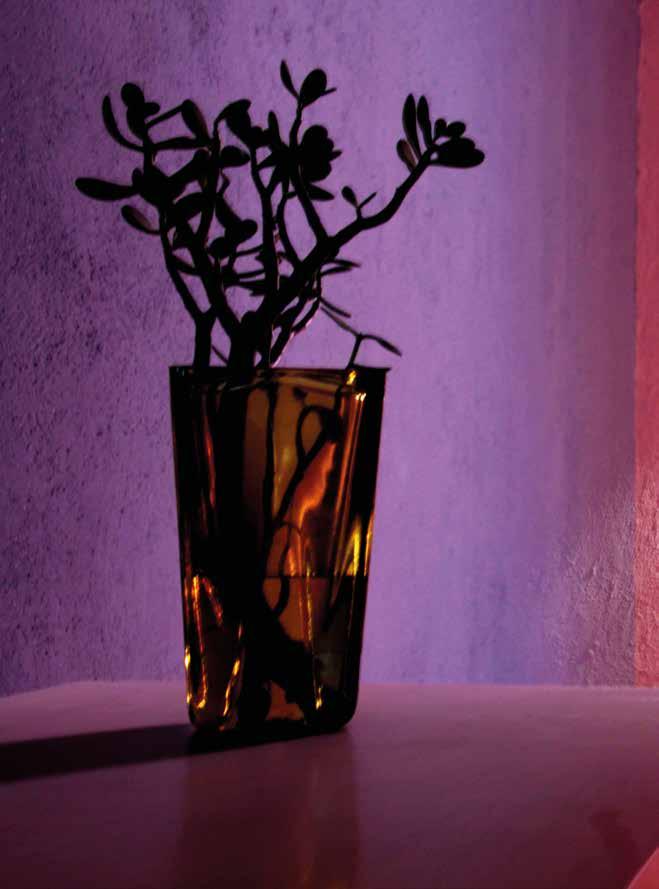

ORO Editions
Publishers of Architecture, Art, and Design
Gordon Goff: Publisher
www.oroeditions.com
info@oroeditions.com
Published by ORO Editions
Copyright © Jenny Okun and ORO Editions 2023
Text and Images © Jenny Okun 2023
Graphic Design: Pablo Mandel / circularstudio.com
Typeset in Norms Pro
All rights reserved. No part of this book may be reproduced, stored in a retrieval system, or transmitted in any form or by any means, including electronic, mechanical, photocopying of microfilming, recording, or otherwise (except that copying permitted by Sections 107 and 108 of the U.S. Copyright Law and except by reviewers for the public press) without written permission from the publisher.
You must not circulate this book in any other binding or cover and you must impose this same condition on any acquirer.
ORO Managing Editor: Kirby Anderson
10 9 8 7 6 5 4 3 2 1 First Edition
Library of Congress data available upon request. World Rights: Available
ISBN: 978-1-957183-40-4
Color Separations and Printing: ORO Editions, Inc. Printed in China.
International Distribution: www.oroeditions.com/distribution
ORO Editions makes a continuous effort to minimize the overall carbon footprint of its publications. As part of this goal, ORO Editions, in association with Global ReLeaf, arranges to plant trees to replace those used in the manufacturing of the paper produced for its books. Global ReLeaf is an international campaign run by American Forests, one of the world’s oldest nonprofit conservation organizations. Global ReLeaf is American Forests’ education and action program that helps individuals, organizations, agencies, and corporations improve the local and global environment by planting and caring for trees.
www.oroeditions.com
